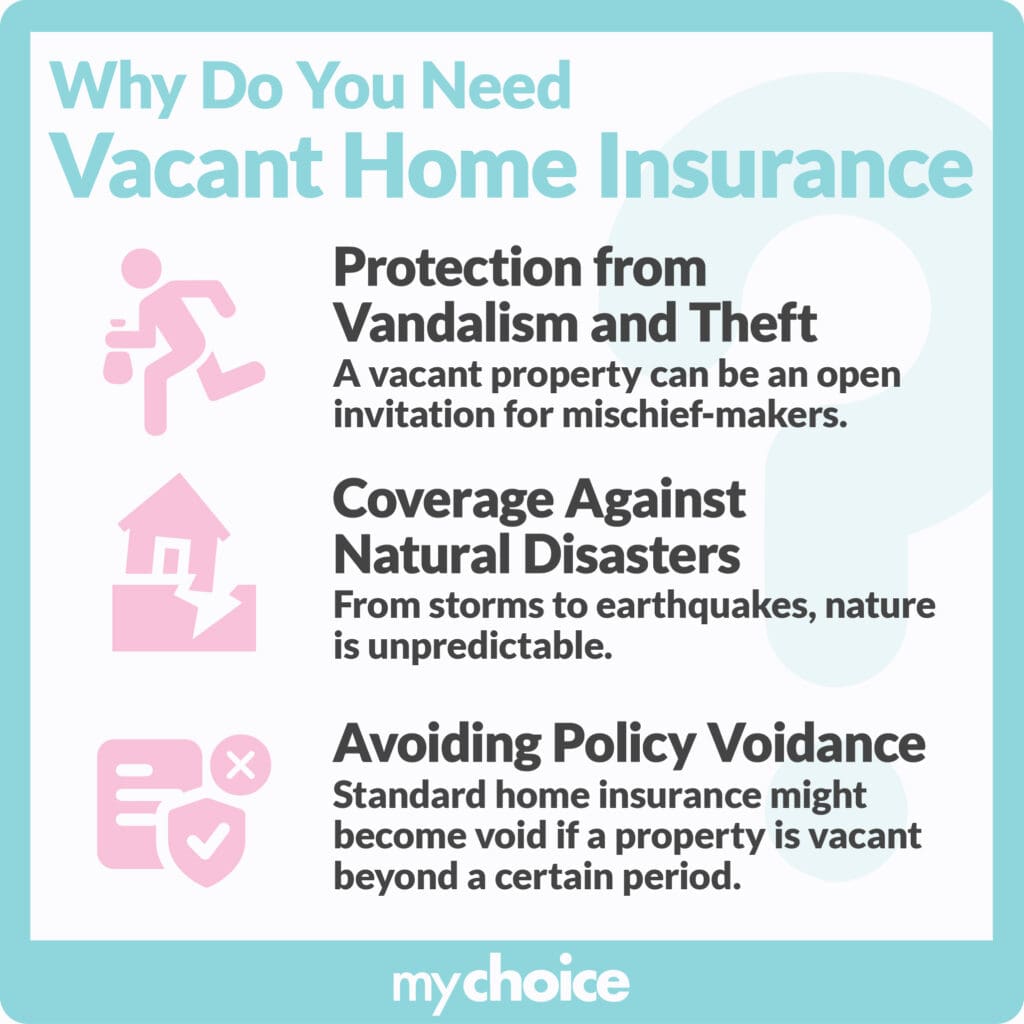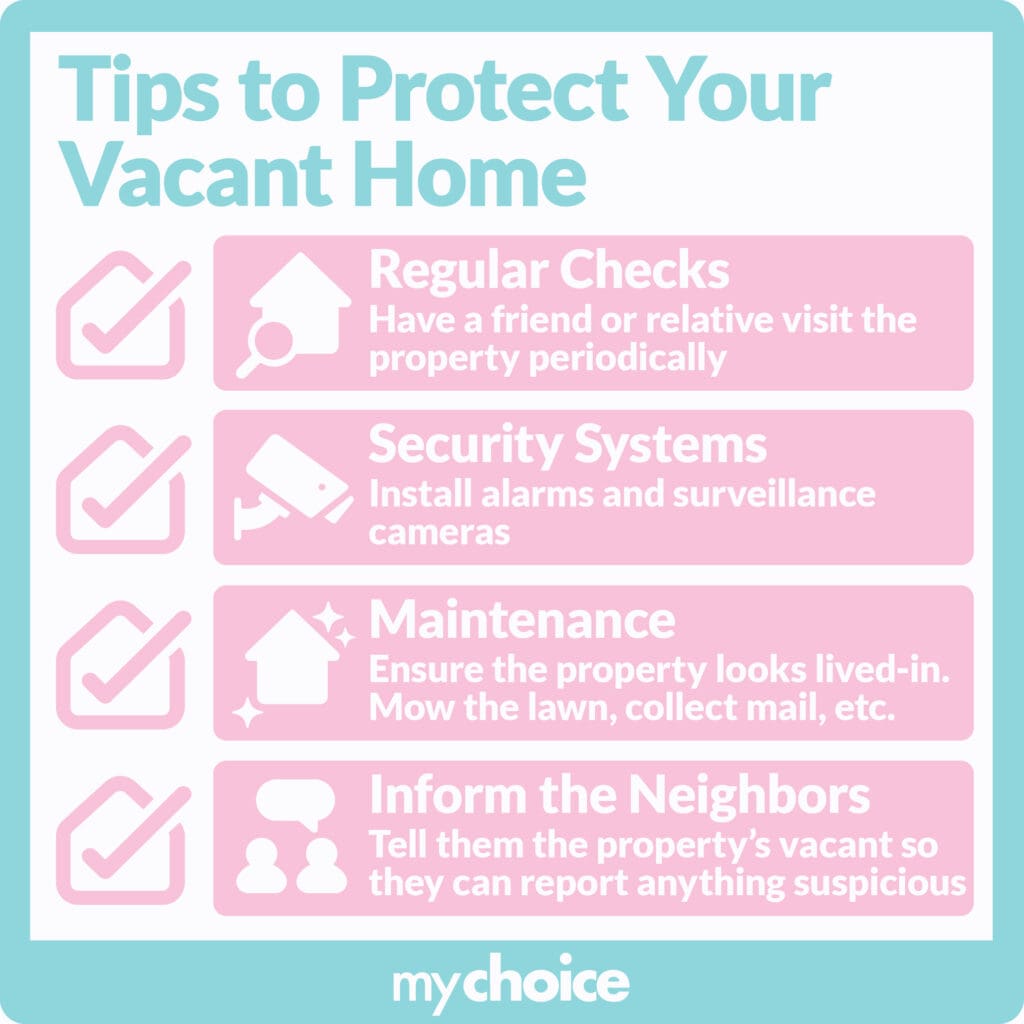A home can be left vacant for some time for several reasons, such as listing it for sale or conducting extensive repairs. But no matter the cause, an unoccupied property is always open to risks like theft, with nearly 1.3 million property crimes reported in Canada in 2022. Vacant home insurance offers protection from these risks, covering a vacant property from a range of threats for a prolonged period.
Should you get vacant home insurance in Canada? Keep reading to learn when you should get home insurance for a vacant property, how long insurers cover unoccupied houses and condos, and how you can get lower vacant home insurance rates.
What Does Vacant Home Insurance Cover?
Vacant home insurance in Canada typically covers the following risks:
- Vandalism and theft
- Fire and smoke damage due to arson or electrical problems
- Water damage from burst pipes, leaks, and flooding
- Damage from hail, storms, and other weather events
- Liability coverage to protect homeowners if someone is injured on the vacant property
Note that vacant home insurance has some limits to its coverage. Here are some restrictions that are usually included by Canadian insurers:
- Coverage limits: Vacant home insurance usually covers fewer perils and reduced coverage limits compared to a standard home insurance policy, as an empty home is seen to be under greater risk by insurers.
- Occupancy requirements: Insurers require homeowners to perform regular maintenance or take specific steps to mitigate risks to the property.
- Higher insurance premiums: Because of the greater risks associated with vacant properties, vacant home insurance premiums tend to be higher.
When is Vacant Home Insurance Necessary?
Canadian homeowners who may be away from their property for long periods should contact their insurers. Anything can happen to a home that’s left vacant for weeks on end, leaving it vulnerable to natural disasters, mischief-makers, and maintenance issues like faulty wiring or flooded basements.
Here are some instances where vacant home insurance may be necessary:
- Extended vacations or absences: Do you travel for weeks at a time or have a vacation home that you leave unoccupied for most of the year? A standard home insurance policy may not cover the property if it’s vacant for a prolonged period.
- Properties for sale or rent: If you’re selling or renting a house that’s no longer your primary residence, you’ll need special insurance until you find a buyer or tenant.
- Inherited property: If you recently inherited property and are still uncertain what to do with it, vacant home insurance will keep it covered until you make a decision.
- Renovations: If you don’t occupy your home for a long time because of extensive renovations, you may need vacant home insurance to cover it until you move back in.
- Vacation or holiday property: You may have a second home that you only occupy during the holidays or planned vacations.

What’s The Difference Between an Unoccupied and a Vacant Home?
An unoccupied home and a vacant home are different for insurers. While both may not have people living in them for a prolonged period, an unoccupied home can be lived in by the owner at any time down the line – there’s an intent to return at some point.
Examples of unoccupied homes are second vacation homes, homes that can’t be occupied during renovations, or homes that are empty because their owners have been hospitalized for several weeks. If your home will be “unoccupied”, talk to your insurer to see if they’ll allow your home insurance policy to extend coverage even past 30 days, or if you’ll need vacant home insurance.
Vacant homes, on the other hand, are properties that an owner doesn’t live in and doesn’t have any intent to live in. Typically, these homes will have the utilities turned off or have no furniture or appliances in them. These are investment properties sitting on the market for sale or rental. Vacant homes will still need home insurance to protect them until their owners find a tenant or buyer.
How Much Does Vacant Property Insurance Cost?
Vacant property insurance can vary between insurers depending on several factors, but one thing’s for sure: because of the increased risks that vacant homes face, their rates tend to be higher than home insurance premiums. Here are factors that will affect your vacant property insurance rates:
- The length and reason for your property’s vacancy
- The size and location of your home
- Installed security measures, such as smart alarms, gates, and locks
- The time between check-ins from people like caretakers or family members, if any
- Your insurance claims history
- The crime rate in your neighbourhood
- Any unfinished construction, repairs, or plans you may have for renovations
- Intent to sell or rent out the vacant property
These are just some things that Canadian home insurers take into consideration before calculating your vacant home insurance premiums. Shop around, compare premiums, and don’t be afraid to ask what you can do to get a lower rate.
Tips for Protecting Your Vacant Home
Vacant condo insurance or house insurance can be pricey, but there are things you can do to better secure a vacant home. Insurers will send someone to inspect your property to assess its protection. The more protected your property, the lower your vacant insurance premiums will be, so consider adding these security measures to get the best quotes:
- Do regular visits periodically: If you can’t drop by yourself, ask a trusted neighbour, family member, or friend to check on the property from time to time. This gives people in the area the illusion that it’s occupied from time to time.
- Incorporate security measures: Make your home safer by installing measures that deter and keep out intruders. If you have a smart home system, set motion sensor-activated or timed lights to turn on at different hours. You can also install video cameras that you can view and access through your smartphone and add deadbolt locks to your doors.
- Maintain your property: Have someone mow the lawn, rake leaves, and collect the mail so your property appears lived-in.
- Park a vehicle in front of the property: If you can, ask a neighbour or friend to park their car on your driveway to fool would-be intruders into thinking the house is occupied.
- Install sprinklers and fire alarms: Fires from nearby buildings, faulty wiring, or other causes can destroy your home in your absence. Get smart alarms that activate sprinklers and alert you on your mobile devices.
- Remove valuable items: Take expensive objects such as art, jewelry, and electronics out of your home if you will be away for a long period and store them at a safe, separate location.

Key Advice From MyChoice
- Notify your insurer when you plan to be away from your home for a lengthy period. They can explain if it will still be covered by your home insurance policy and if you need additional coverage.
- Don’t skip on informing your home insurer. If anything happens to your home and you were away from it from longer than 30 days without telling them, they may void your home insurance policy and reject your claim.
- Different companies have different underwriting processes, and you may find a better deal or more coverage by shoppping around. Compare quotes between different vacant home insurers using MyChoice to find the best deal for your needs.
- Taking certain safety measures like adding smart alarms or stronger locks may reduce your vacant insurance premiums. When possible, enlist the help of friends and neighbours to give the appearance that your house is occupied to reduce the risk of vandalism or robbery.








